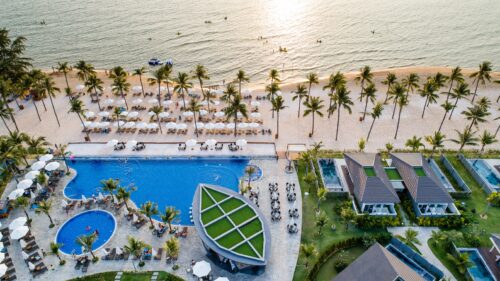Promoting Business-Friendly, Ocean-Friendly Practices in Vietnam’s Tourism Sector

Vietnam’s rapid economic growth due to the boom of ecotourism in coastal cities and islands has directly increased the amount of solid waste that is generated daily. Phu Quoc Island, which reported more than 760,000 visitors in the first quarter of 2018, is emblematic of this challenge: as tourism continues to rise, resorts and other businesses catering to tourists will be critical to effectively managing plastic waste to ensure it does not end up on the island’s beaches and surrounding ocean. To support Phu Quoc Island in its ocean plastic reduction efforts, the USAID-funded Municipal Waste Recycling Program (MWRP) provided a grant to the World Wide Fund for Nature – Vietnam (WWF) for its project, which supported leading hotels in finding innovative alternatives to plastic disposables.
One such hotel is the Novotel Phu Quoc Resort. Mr. Mohamed Oughdoud, the Executive Assistant Manager of the hotel, is the driving force behind the hotel’s commitment to reducing plastic waste.
In 2018, Mr. Oughdoud attended a Phu Quoc Chamber of Commerce event where he met WWF staff and learned that plastic products, such as straws, bottles, drink stirrers, food containers, laundry bags, etc. make up more than 70% of marine litter on the island’s beaches. Having supervised the purchase and procurement of supplies for the resort, Mr. Oughdoud knew that the Novotel Phu Quoc Resort used many of these plastic products and he was troubled by the quantity of waste the resort was producing. Determined to make a difference, he contacted WWF and expressed his interest in reducing the hotel’s plastic waste, launching a partnership between WWF and the hotel.
When Mr. Oughdoud first brought the idea of plastic-reducing practices to the Novotel Phu Quoc Resort’s top management, he was met with hesitation due to the high investment of time and money into environmentally conscious alternatives. Mr. Oughdoud, however, worked with WWF to identify alternatives to plastic products commonly used at the resort and produced a comprehensive plan outlining Novotel Phu Quoc Resort’s commitment. The plan, entitled New Commitment to Less Plastic in Novotel Phu Quoc, clearly presents the costs and benefits for replacing each single-use plastic item in the hotel, specifically straws and plastic cotton buds, along with an estimated time for capital return.
Ultimately, Mr. Oughdoud successfully demonstrated to the management that while it is not financially profitable to replace all plastic items, there are key plastic alternatives that would economically benefit the resort. Novotel Phu Quoc Resort has since signed an official commitment to transparently implement plastic-reducing practices, including providing paper straws and cups to guests, eliminating the use of plastic takeaway containers, reducing plastic water bottles, and separating waste at the source.
Through his advocacy, Mr. Oughdoud has placed the Novotel Phu Quoc Resort at the forefront of the plastic reduction movement and shown other businesses that change is possible. “My fight is not just to reduce plastic. We must also respect our planet to live together with wildlife peacefully. Only then can our world get better. I hope my message inspires other people to do the same or even better,” concluded Mr. Oughdoud.
By demonstrating that businesses can successfully implement environment-friendly policies without compromising profit, WWF hopes that Mr. Oughdoud and his team will inspire other entrepreneurs, community members, tourists, and governmental officials to join the effort against ocean plastic pollution.

